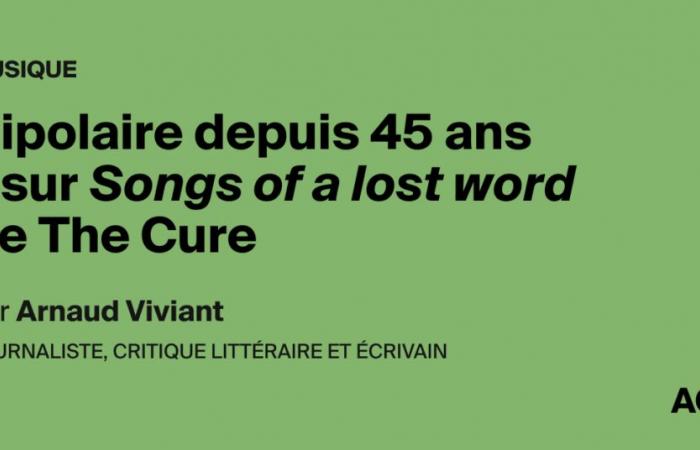Bipolar for 45 years – on Songs of a lost word de The Cure
By Arnaud Viviant
I listen to the record. Once. Twice. And even three to reassure my world. So much so that as an expert, I can certify that Songs Of a Lost World is a fake last disc. Fortunately a beautiful fake, as reassuring as possible, where Robert Smith and The Cure persist in their being, as they should.
We should have immediately been wary of a punk or post-punk band having decided to call themselves The Cure, in other words a “No Future” in a phase of remission. Healing (the cure) is perhaps the only true illness of bipolar. But it is serious. The cure is more serious than the illness: this is the diagnosis that the bipolar person always poses on himself and his conditions of existence which he now insists on falsifying on his own like a grown-up.
And here, for example, our model of an imaginary patient, Robert Smith, is releasing a new album after sixteen years of silence. And forty-five years after his entry onto the small stage of our lives. This doesn't make sense. Let us know once and for all, that sixteen years of silence, no more than seventeen seconds of noise, will never have the slightest meaning in one sense. Einstein on the bitch.
From the top of the sinusoids of Songs of a lost wordhalf a century of bipolar disorder gazes upon us in complete disenchantment. One of those songs of smoking ruins that today's images, filmed by drones (Smith dedicates a song to them, not the best) teach us to look in the face without blinking or even thinking about the corpses of children and their parents who, below, lie.
By turning around slowly, as the boomer who is stingy with abrupt gestures has learned to do, this new Cure record forces the teenager from the mid-70s, having grown up in the prison-liberal France of Giscard, to ask himself why he had decided that The Cure was going to be son band. There was perhaps already there, contrary to appearances, a real movement of hope; a drive for life well disguised under Robert Smith's lipstick and dripping mascara.
Supply was then much higher than demand. The year of Killing An Arabwe were just emerging from the punk wave in which an American academic a few years later would see an extension of situationism. Why not ? As if Françoise Giroud had been a rock critic, or as if we had no more ideas than a surfer philosopher, the groups that emerged from the ashes of the punk movement, this second Great Fire, were called “new wave”. of London, after that of 1666.
In this artistic blur that is adolescence, and through one of those multiple-choice questionnaires which were beginning to establish themselves in the soft sciences, we were suddenly asked to decide between the nihilism of the Sex Pistols and then of Public Image Ltd, the Sandinism of Clash, the sado-Leninism of the Stranglers or even the annoying drone of the Buzzcoks, these lettrists of punk. To speak, of course, only of the English. Although these “groups” (a term which designated many things at once in our world; but which, in the solitude of our fifteen years meant above all that three or four people friends or supposed, gave concerts under the same name, often taken at random from the dictionary, as Dada had been), were still very young in 1978, their commitment in the name of destruction or revolution, words which went very well together as in a French Beatles song, already made them adults in our eyes.
They sang well No More Heroesthey had become one, despite themselves. On the walls of our rooms, we had to look up to look at them like already iconic effigies. The society of the spectacle does not pay for words, they reinstated a verticality which, deep down, we did not want or no longer wanted. The air of nothing, they held speecheslike these politicians who were indifferent to us. We greatly admired, in this fortress that was our innermost being, the “groups” which advocated: some, insurrection; who, the riots; which, sexual liberation or any other less priapic one (we were already no longer on the side of ambitious competitive enjoyment). And who, peace even if this pure market segment now appeared to us in all its falsity. Among our favorites from the outset, there were also all the groups which advocated, in a form ofavatar, stupidity. A word that our parents and teachers constantly used to hurt us by referring to our beast status. Having become parents in our turn, we would never cease to apologize to our own children for the use of such an ignominious term. Well before this maturity, we already wanted a Mister Hates whose “stupidity”, for once, would be the strong point.
Bipolarity appeared as a perverse power of life of which Robert Smith was not the hero, but the herald.
In fact, the one we expected as a messiah and who was going to be Robert Smith against all expectations, would have to resemble an Oblovomian hero who would have only one watchword: “ Let’s go to bed “. Not to fuck, of course, according to the always-acquired evidence of ordinary pop Music, the one that ultimately disappointed us. But on the contrary, going to bed in a mood that wanted to be both thoughtful and strategic, in a Proustian neurasthenic lethargy if you like. Go to bed, to hide under the covers of books or records, in the futon of divorced parents, which would above all have become that of all our: “what if we!” “.
At the time, there was a lot of mockery for these so-called pop singles that Robert Smith released after two or three defining albums that seemed etched in funeral marble. These singles were suddenly marked with a life drive like the cycle full of sap of bipolarity which abandons the dichotomy between psychosis and neurosis. It was in fact two years after the appearance of The Cure, in 1980, that the third edition of Diagnostic and Statistical Manual of Mental Disorders would thus make the term bipolarity appear to break with the usual classifications. By appearing psychically as the hope of despair or the despair of hope, bipolarity appeared as a perverse power of life of which Robert Smith was, not the hero, but the herald.
If there is an unexpected date to remember in our existence, it is that of 1is November 2024. Forty-five years ago all the record stores would have been closed on All Saints' Day with its chrysanthemum merry-go-round. But the de-Christianization of our society, which no one will complain about, at least among fans of this pop paganism that Cure has embodied quite well, means that today the stores are open. Passing alongside a number of cyclists, I walk through Paris to go buy “the new Cure”. After some very 70's escalators, I enter the store. Of course, the disks are located in the third basement, the only one that will resist future bombings. A novelty, finally, in my poor life: I have to hesitate for about 17 seconds between the vinyl or CD format. Then I pay alone, with my contactless card, by scanning the barcode at a terminal, that's new too. In forty-five years, we have never been such a solitary lover in consumption.
I'm going home. I see that critics are writing: “It's quite normal that the new The Cure comes out on All Saints' Day” which has somehow become Halloween. I listen to the record. Once. Twice. And even three to reassure my world. So much so that as an expert, I can certify that Songs Of a Lost World is a fake last disc. Fortunately a beautiful fake, as reassuring as possible, where Robert Smith and The Cure persist in their being, as they should. It's nothing to say that we're happy to find his cotton voice almost intact. Everything rocks there, like the first day. But, from the first song to the last, there is this lie maintained that this Cure album is the ultimate milestone in their discography.
It begins, in Alonea virtuoso piece seemingly escaped from Pornographywith the first words that Robert Smith sings: “ This is the end/ Of every song that we sing “. Everything here suggests that it smells like pine. And yet no, of course, like the second title, of a completely different feverish polarity, the aptly named And Nothing Is Forevergoes and tells it. In third position, the hit that we already knew from the Internet, Fragile Thingarguably one of the most perfect pieces Robert Smith ever composed, which ends with “ i will be with you to the end “. Words which hit hard the bipolar person who remembers that during each of his sentimental separations, he said to himself, in a guilty way: “But Robert is always with Mary”.
Unlike us, did Robert Smith know the secret of infinite love? Thus, these false funerals follow no matter what (if we except the insolent solos of Reeves Gabrel, this sub-Robert Fripp who, I remember, was already annoying us with Bowie) with great satisfaction for I can never say goodbye which should soon end all future concerts in style. Until the eighth and final title appropriately titled: End Song. A quintessence of Cure: one of its definitive-looking false endings which give hope, despite everything. “ It’s all gone » chanted Smith at will.
To healing as to healing.
Songs of a lost worldThe Cure, November 1, 2024.
Arnaud Viviant
Journalist, literary critic and writer
Shelves
Culture and Music






